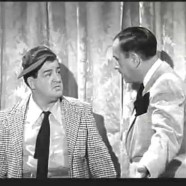Why We Need Gender Neutral Plural Pronouns
©2015 by Dallas Denny
Who’s On First
Or Why We Need Gender Neutral Plural Pronouns
By Dallas Denny
They, them, and their are gender-neutral pronouns used in English to refer to more than one person or thing. “They’re on their way. That’s them now.” “The chairs are on their sides.” And get this: those three are the only ones we have.
These pronouns have been used for centuries in speech when the gender of a single person isn’t known: “If someone asks for me please tell them I’ve gone to the store.” “Someone left their coat on the chair. I imagine they’ll be missing it soon.” Such usage is slowly becoming acceptable in written language, a trend that has been accelerated of late by their widespread adoption by gender nonconforming and genderqueer people.
It’s certainly appropriate for people to choose the pronouns by which they prefer to be identified, but I have to say the appropriation by individuals of the only (so far as I know) English group pronouns leaves us with no pronouns when we need to refer to groups of people or things.
We can, of course, use the same pronouns to simultaneously refer to both individuals and groups, but this can quickly lead to semantic confusion. I learned this the hard way recently over dinner. Things quickly went to “Who’s On First” territory.*
The discussion was a post-conference “what did we do right, what did we do wrong” session by planners of a transgender convention. One of a pair of gender nonconforming people at a conference had been snippy and one (or perhaps both; we weren’t sure) had seemed unhappy. We were trying to make sense of what had happened and out of respect were using the preferred pronouns of the individuals. Here’s the way the conversation went, more or less:
“So at registration I complemented them about their hair and they scowled at me and said ‘We don’t talk about the hair.’”
“We don’t talk about their hair?”
“We don’t talk about their hair. Even though we thought their hair was cute.”
“Wait a minute! Whose hair?”
“Their hair.”
“Their hair or their hair?”
“Exactly.”
“I’m confused. Whose hair?”
“Their hair.”
“Both their hair or one of their hair?”
“One of their hair.”
“And they were upset because we mentioned their hair?”
“They were.”
“Both of them?”
“No, only they was upset.”
“They was upset?”
“Exactly.”
“That doesn’t sound quite right. They was? Shouldn’t that be they were?”
“Possibly. We know they was upset, but the other they might have been upset too. We don’t know, but we think only one of them.”
“So, which one was upset?”
“They was.”
“But they weren’t?”
“Exactly.”
“I think I need another drink.”
I would hate to see the English language left without pronouns that differentiate between one person and several or many persons. It’s just damn confusing.
And so, genderqueer and gender nonconforming people, those of you who prefer to be referred to with the pronouns they and them and their, perhaps you would be so kind as to invent new plural gender-neutral pronouns for yourselves rather than appropriating the only ones we have.
* Who’s On First?
You know the old Abbott and Costello Who’s on First baseball routine, right? If not, you should. Here it is in part. It’s wonderful word play.
Bud Abbott: Strange as it may seem, they give ball players nowadays peculiar names.
Lou Costello: Funny names?
Abbott: Nicknames, nicknames. Now, on the St. Louis team we have Who’s on first, What’s on second, I Don’t Know is on third—
Costello: That’s what I want to find out. I want you to tell me the names of the fellows on the St. Louis team.
Abbott: I’m telling you. Who’s on first, What’s on second, I Don’t Know is on third—
Costello: You know the fellows’ names?
Abbott: Yes.
Costello: Well, then who’s playing first?
Abbott: Yes.
Costello: I mean the fellow’s name on first base.
Abbott: Who.
Costello: The fellow playin’ first base.
Abbott: Who.
Costello: The guy on first base.
Abbott: Who is on first.
Costello: Well, what are you askin’ me for?
Abbott: I’m not asking you— I’m telling you. Who is on first.
Costello: I’m asking you— who’s on first?
Abbott: That’s the man’s name.
Costello: That’s who’s name?
Abbott: Yes.
Costello: When you pay off the first baseman every month, who gets the money?
Abbott: Every dollar of it. And why not, the man’s entitled to it.
Costello: Who is?
Abbott: Yes.
Costello: So who gets it?
Abbott: Why shouldn’t he? Sometimes his wife comes down and collects it.
Costello: Who’s wife?
Abbott: Yes. After all, the man earns it.
Costello: Who does?
Abbott: Absolutely.






